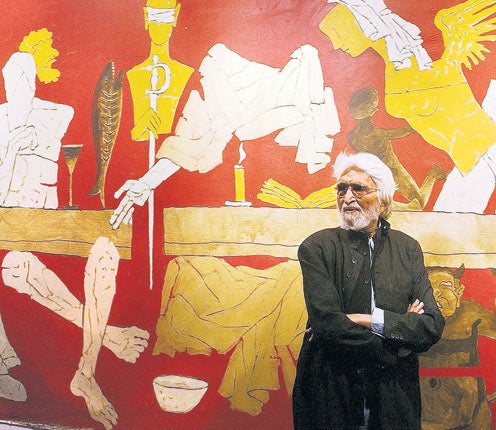Your support helps us to tell the story
From reproductive rights to climate change to Big Tech, The Independent is on the ground when the story is developing. Whether it's investigating the financials of Elon Musk's pro-Trump PAC or producing our latest documentary, 'The A Word', which shines a light on the American women fighting for reproductive rights, we know how important it is to parse out the facts from the messaging.
At such a critical moment in US history, we need reporters on the ground. Your donation allows us to keep sending journalists to speak to both sides of the story.
The Independent is trusted by Americans across the entire political spectrum. And unlike many other quality news outlets, we choose not to lock Americans out of our reporting and analysis with paywalls. We believe quality journalism should be available to everyone, paid for by those who can afford it.
Your support makes all the difference.Maqbool Fida Husain, the painter dubbed the "Picasso of India", died yesterday in London five years after Hindu zealots who were angry at his work forced him to leave his homeland. He was 95.
"He died of old age," Munna Zaveri, who was his friend for 40 years, said. "He was in hospital for some time and was supposed to come home today or tomorrow but his condition worsened."
Husain's work was a blend of cubism and classical Indian styles that helped put modern Indian art on the global arena. His canvasses sold for millions of dollars.
His depictions of naked Hindu goddesses enraged zealots who attacked his house, vandalised shows displaying his work and drove him from India. For years, galleries were too frightened of protests to display his work.
In 2006, he moved from Mumbai to Dubai and later to London. In 2010, he accepted Qatari citizenship, a step that led to much soul-searching in India over whether the world's largest democracy could guarantee artistic freedoms.
Husain said he was too old to fight "tooth and nail" and he craved the comforts and facilities needed for his work. Borders did not matter to artists and his work would still be influenced by India's culture, he said in a 2010 television interview.
His death was mourned by artists and drew condolences from politicians, several of whom had been criticised for not being able to guarantee him the freedom he needed when he lived.

Join our commenting forum
Join thought-provoking conversations, follow other Independent readers and see their replies
Comments